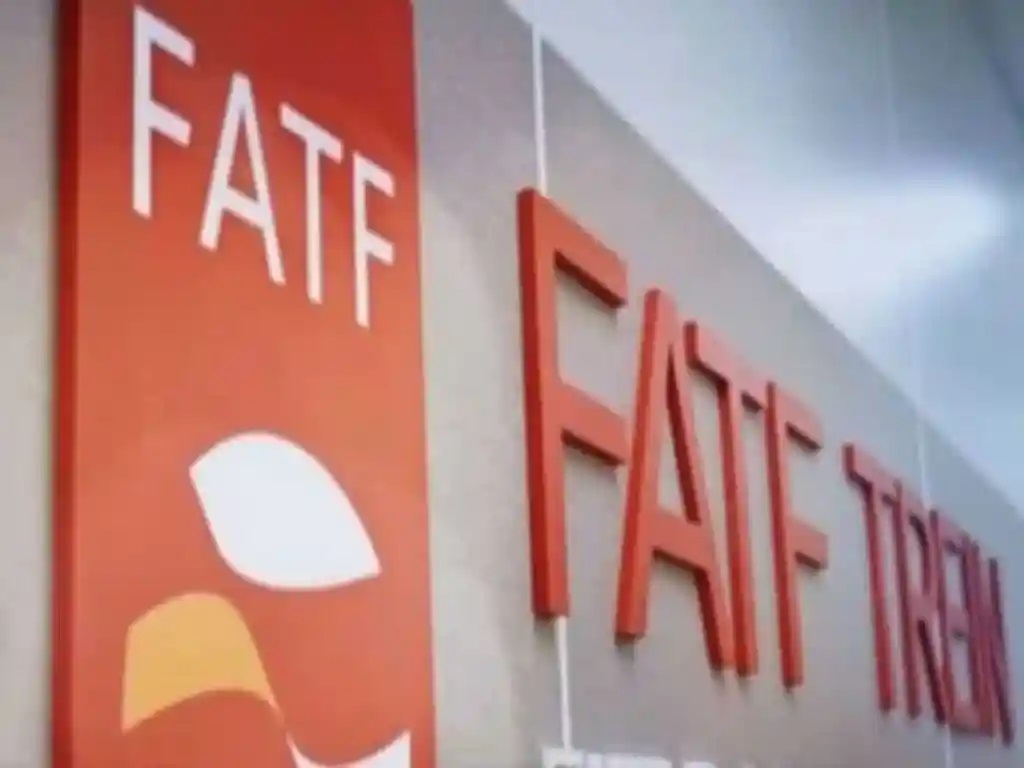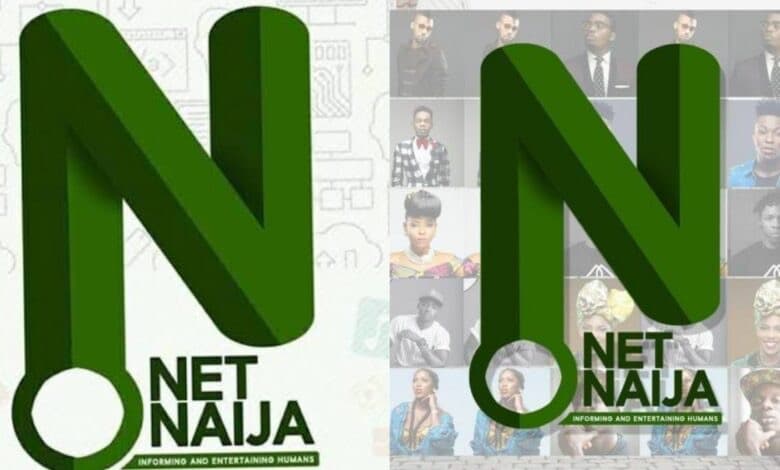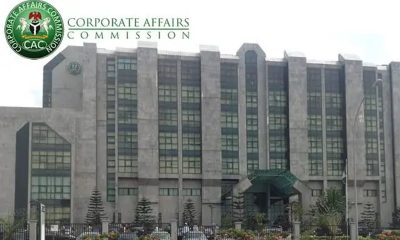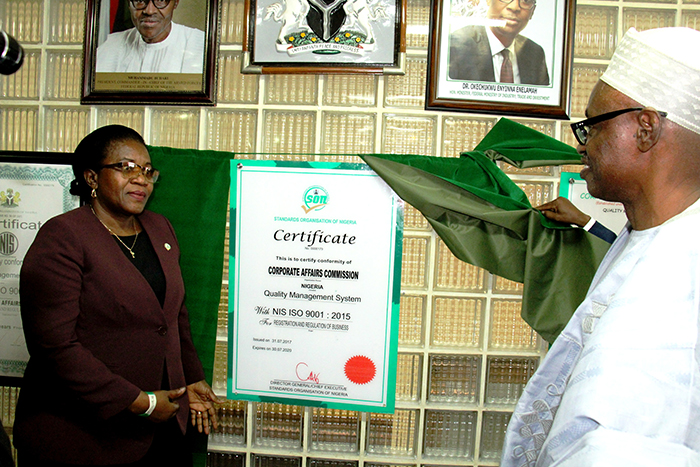General
CAC Moves to Remove Nigeria from FAFT Grey List

By Adedapo Adesanya
The Corporate Affairs Commission (CAC) has inaugurated a Beneficiary Ownership Register (BOR) aimed at removing Nigeria from the grey list of the Financial Action Task Force (FATF).
The Registrar-General of CAC, Mr Garba Abubakar, made this disclosure at a workshop on the use of BOR organised by the commission in Lagos on Wednesday.
BOR allows anyone with a stake of five per cent or more in a legal entity or corporation to disclose such to CAC through the company where it is domiciled.
Business Post reports that FATF, an intergovernmental policy-making body that seeks to combat money laundering and the financing of terrorism, placed Nigeria on its grey list of the global watchdog for money laundering and terrorist financing earlier this year.
Mr Abubakar, however, said that the placement of Nigeria on the FATF grey list meant the country stood the risk of losing investors.
The CAC boss explained that the new BOR initiative had a legal framework aimed at curbing money laundering and illicit financial flows carried out using corporate companies.
He said the BOR which was launched on May 25, asides from closing gaps, would help Nigeria exit the FATF grey list.
According to him, it will also try to make information about beneficial owners available to aid investigations and work.
Mr Abubakar noted that the concept of the BOR disclosure would also support some provisions in the Company and Allied Matters Act (CAMA) 2020.
He said: “To know who may control a company, you may need to lift some veils, and we must know how most procurements and processes are carried out using corporate companies.
“It is only proper for attention to be focused on companies, and this BOR is the legal framework to support that to promote an open and transparent register of beneficial ownership.
“Stakeholders agreed that CAC should drive the process for beneficial ownership implementation and provisions were included in CAMA to support the disclosure.
“By the provision of Section 119 of CAMA, if you control up to five per cent of shares or control any influence or have any trust arrangement whether registered or not, you have to disclose to the company within 30 days.
He also noted that the company discloses to the CAC within seven days of disclosure.
“Dynamics like disclosing any form of political affiliation is critical to ascertaining if there is any sort of connection to the business.
“All these and more are the gaps we need to close to satisfy the requirements of FATF, and we would continue to map out strategies to address these concerns,” he said.
Mr Abubakar said that with the BOR, lawyers, government agencies, and civil societies doing investigative reports, do not need to write to the commission before they could get information on the beneficiary ownership register.
He added that there was an application that allowed for system integration to check and was available publicly.
The registrar-general, however, said there was a level of safeguard for some levels of private information and the consequences of making such information available.
Mr Abubakar said the commission was committed to giving the general public the best of services and would continue to improve to meet their needs.
General
Court Acquits Abba Kyari of 23-Count Asset Declaration Charge

By Adedapo Adesanya
Justice James Omotosho of the Federal High Court in Abuja has discharged and acquitted the suspended Deputy Commissioner of Police Abba Kyari of a 23-count charge of alleged non-declaration of assets filed against him by the National Drug Law Enforcement Agency (NDLEA).
Mr Kyari is being charged alongside his two brothers, who were accused of swearing to false affidavits to conceal the origin of some properties.
The court in its judgment held that the NDLEA failed to provide sufficient evidence to prove its case against the defendants, which is mostly the non-declaration of land properties.
Justice Omotosho noted that proving ownership of landed properties can be done through traditional history, title, acts of possession and possession by connection.
The prosecution did not provide any of these documents to show that the said properties located in Fountain Estate, Kasana, which belong to Ramatu Kyari, are truly owned by the police officer.
Also, the court held that the prosecution did not provide the same material evidence linking Mr Kyari to properties in Linda Choko Road, Asokoro and also Maiduguri in Borno State.
Mr Kyari, in his defense said the properties in Borno belonged to his father, which he left for him and his siblings.
It was judged that the prosecution did not prove otherwise, adding that the prosecution charged Mr Kyari’s brothers in bad faith for alleged conspiracy, which they failed to prove.
General
NCC Arraigns Netnaija’s Emma Analike Over Alleged Copyright Infringement

By Modupe Gbadeyanka
The chief executive of Netnaija Media Enterprises, Mr Emmanuel Analike, has been arraigned before a Federal High Court sitting in Abuja by the Nigerian Copyright Commission (NCC).
The suspect appeared before Justice Suleiman Liman on Wednesday over allegations bordering on copyright infringement.
He was accused by the NCC of using his online platform to make movies and others not belonging to him available for users to download on the internet.
According to the agency, Mr Analike has infringed copies of audio-visual materials distributed online via his website for online users. Netnaija is an online movie and music download site.
The prosecution counsel, Ms Gladys Isaac-Ojo, who works with the NCC, told the court that the defendant committed an offence contrary to and punishable under Section 44 (1) (a) of the Copyright Act, 2022.
However, Mr Analike pleaded not guilty to the charges preferred against him, prompting his counsel, Nnemeka Ejiofor, seek his bail.
The lawyer informed the court that the application was filed on Monday and supported by 23 paragraphs of affidavits and a written address.
But the judge refused to give a bench ruling and adjourned the ruling of the bail application to Monday, March 9, 2026, ordering the remand of the Netnaija chief in Kuje Correctional Centre.
General
Entries Open for ClimateLaunchpad Green Business Ideas Competition

By Modupe Gbadeyanka
Entries for the 2026 edition of the world’s largest green business ideas competition, ClimateLaunchpad, have opened.
In 2025, the programme, organised by Climate KIC, received over 2,700 applications from 40 countries. The winning ventures gain prize money, investor connections, and access to a global cleantech network.
This year’s edition is expected to be bigger and better, with climate innovators, green venture builders, and entrepreneurs from around the world given the opportunity to apply.
Since its inception in 2014, the programme has supported nearly 5,000 ideas across 97 countries, and this year, it is expanding its presence in Asia with Singapore hosting both the regional final and global grand final for the first time.
Participants move through several stages, including an initial mini-course to refine the concept, an intensive multi-day Boot Camp led by expert trainers, targeted coaching to perfect value propositions and investor pitches, national and regional finals, and a place at the global grand final, with prizes and access to a global climate network.
“Strengthening ClimateLaunchpad’s presence in Asia marks a profound new chapter for this programme and for the climate innovation movement more broadly. Asia is where so much of the world’s climate and nature future will be shaped, through business leadership, public-private partnerships and long-term strategic thinking,” the chief executive of Climate KIC, Kirsten Dunlop, stated.
“We look forward to supporting this momentum with new business ideas and innovation ecosystem collaborations across more than a dozen countries.
“This expansion opens space for deeper cross-cultural connections and for first-time founders to turn sparks of imagination into solutions that serve both people and planet,” Dunlop added.
Also commenting, the chief executive of Better Earth Ventures, Ms Rebecca Sharpe, said, “We are proud to host ClimateLaunchpad’s regional and global grand final in Singapore and to convene an international group of climate entrepreneurs from more than 50 countries.
“Climate solutions are emerging from every corner of the world, and bringing them together creates the kind of cross-border exchange and collaboration this moment demands. Our focus is to ensure early-stage founders have the structure, ecosystem access and support needed to move from idea to credible impact.”
-

 Feature/OPED6 years ago
Feature/OPED6 years agoDavos was Different this year
-
Travel/Tourism10 years ago
Lagos Seals Western Lodge Hotel In Ikorodu
-

 Showbiz3 years ago
Showbiz3 years agoEstranged Lover Releases Videos of Empress Njamah Bathing
-

 Banking8 years ago
Banking8 years agoSort Codes of GTBank Branches in Nigeria
-

 Economy3 years ago
Economy3 years agoSubsidy Removal: CNG at N130 Per Litre Cheaper Than Petrol—IPMAN
-

 Banking3 years ago
Banking3 years agoSort Codes of UBA Branches in Nigeria
-

 Banking3 years ago
Banking3 years agoFirst Bank Announces Planned Downtime
-

 Sports3 years ago
Sports3 years agoHighest Paid Nigerian Footballer – How Much Do Nigerian Footballers Earn





















